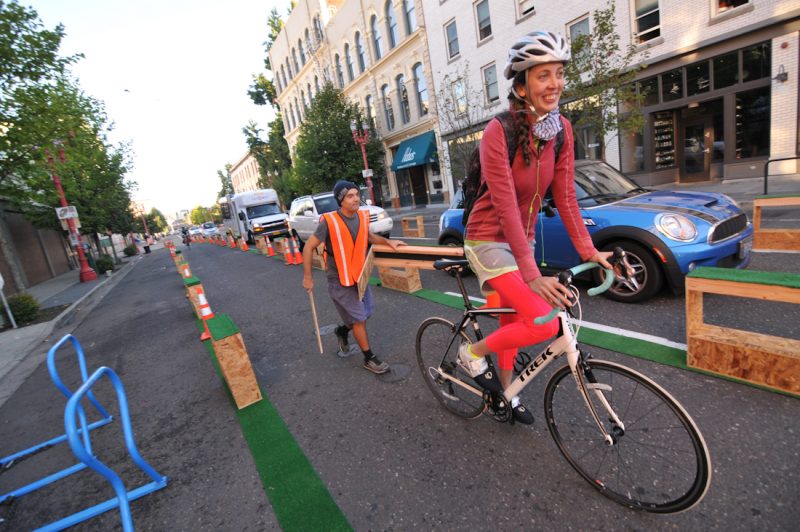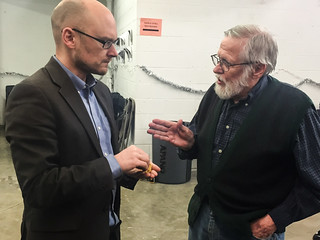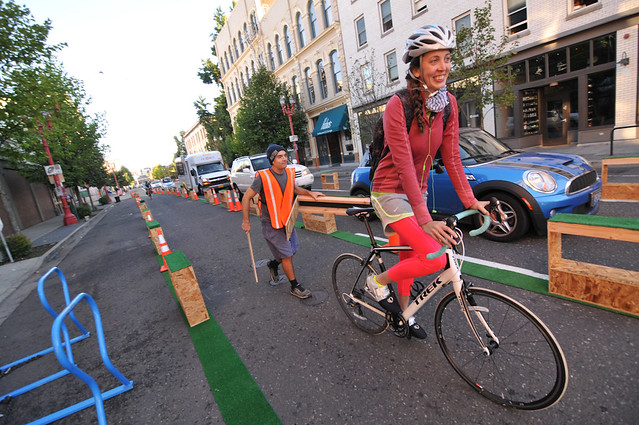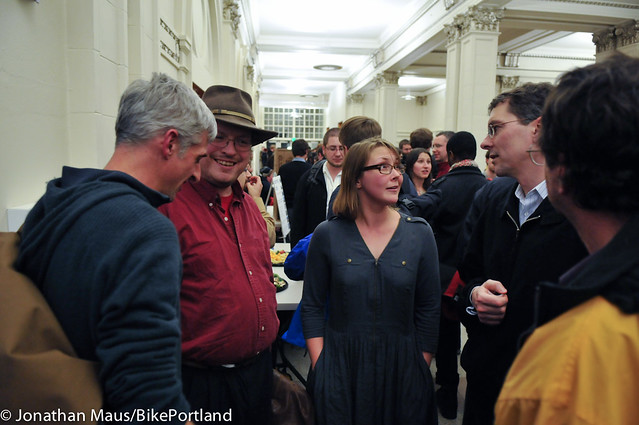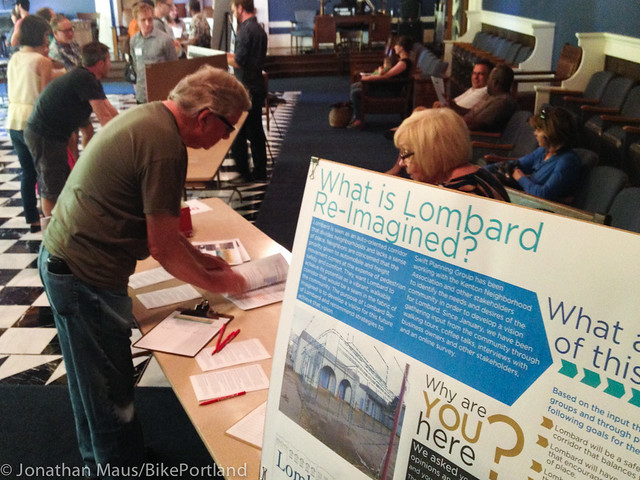Three years ago, when Jonathan and I were drafting the blog posts in which we’d talk about my joining BikePortland, he offered one of his many lessons that have stuck with me.
Don’t write about BikePortland as if it’s a thing I control, he said. Write about it like it’s a community.
My boss for the last three years isn’t always right. (Just ask him.) But that was one of the many times when he is.
I’ve been writing about local government for 16 years now, depending on how you count college. I’ve written for daily, weekly, twice-weekly and monthly newspapers; for topical blogs and nonprofit websites; for a mom-and-pop email newsletter and one time for the Guardian. I’ve never wanted to be anything but a reporter and I still don’t. (Frankly, I’m scared of ever finding out how terrible I would be at a job I don’t love.)
Before I go, I want to share a few of the lessons that being part of the BikePortland community has taught me.
But I’m almost certain I’ll never love journalism more than I’ve loved these three years at BikePortland. Being part of this miraculous journalistic community — and a miracle is exactly what it is — has been the opportunity of a lifetime.
And that’s why I’m leaving, more or less. BikePortland has been my nominally half-time job for three years, but despite my best efforts and despite the saintly respect for my needs as an employee and a person that Jonathan and his wife Juli have always provided, I can’t say no to BikePortland time. I’m typing this at 10:28 p.m. last Tuesday and there’s nothing I’d rather be doing right now. It’s my 1,402nd post for the site.
That equilibrium can’t continue once I’ve got a baby, and in a few weeks, my wife Mo and I will. (Yep, we’re stoked.) Both of us are going down to 60 percent time for a while, and for me that means walking away from BikePortland … because I can’t imagine ever successfully keeping BikePortland work within such neat boundaries. I will, however, get to more or less continue the Real Estate Beat — 10 percent of my professional time will be blogging for Portland for Everyone, a new local campaign that supports advocates for abundant, diverse and affordable housing.
Anyway, enough about me. Though it’s likely that my writing will keep popping up here sometimes, Friday was my last regular day at BikePortland. Before I go, I want to share a few of the lessons that being part of the BikePortland community has taught me.
1) People are hungry for a sense of direction and meaning in their local civic life
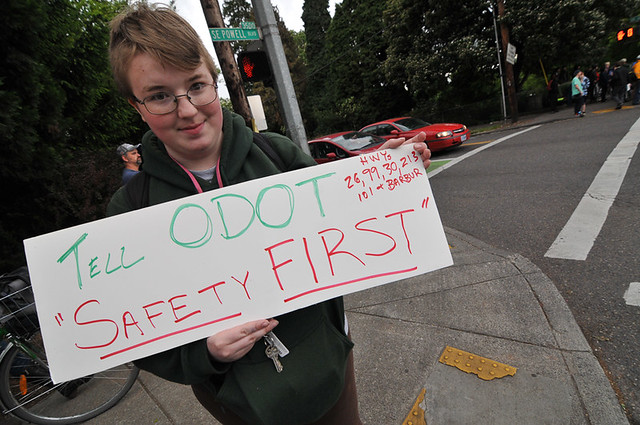
It is extremely common to hear people claim that local journalism is doomed in part because people don’t care that much about it.
That’s baloney.
Finding the money is difficult — Jonathan can tell you, though by any reasonable standard he’s been a wizard at making it work against difficult odds. But finding an audience for news that matters is entirely possible. People feel their locations deeply. People are already telling themselves stories that help them make sense of the places they live; they are grasping for meaning in what are, for most people, a bewildering and unpredictable series of events.
If there’s a problem in the local information market, it’s that there is actually a dangerously large shortage of people attempting to fill the public’s hunger for local news. When no one is providing people with accurate or helpful stories about their city, they wind up grabbing onto false or counterproductive ones, such as “the solution to congestion is more lanes of auto traffic” or “people of different culture X are the cause of my problems.”
BikePortland is fantastic because it’s organized around a story: “better biking can and will make Portland a better city for everyone.” That’s its sense of direction. Not everyone thinks this is the right direction to move, but having that story around is like a breeze on a hot day. You feel good about it just because it’s there.
2) Journalism is at its best when it opens people’s eyes to opportunities they didn’t see before
If I had to pick one accomplishment at BikePortland that I’m most proud of, it’d be the catalytic role we played in the emergence of Better Block PDX and the transformation of 3rd Avenue.
One day in July 2014, Jonathan and I were in the office kicking around story ideas and we decided to roll together three tidbits into an update about what might be BikePortland’s most enduring obsession: the potential for a downtown protected bike lane network.
The post that came out of that conversation happened to be read by two forces of nature: Ryan Hashagen, a young pedicab entrepreneur who had spent years with the patience of Jane Addams, laying the political groundwork for a campaign by retailers to support bike lanes in Old Town, and Boris Kaganovich, a young engineer who looks at car-dominated streets with the impatience of Elon Musk. Working with many essential allies, these two insanely energetic people forced the ambitious, experimental plaza in front of Voodoo Doughnut into existence — and opened the city’s eyes to a new way of making lasting change on its streets.
Better Block took it from there, holding meetings in Greg Raisman’s living room and finding more inspiring leaders like Gwen Shaw.
But the magic moment couldn’t have happened without BikePortland. Our role wasn’t to win an argument or lead a movement, though the site has done those things too over the years (like the time the BikePortland community saved the 2030 Bike Plan — that was cool too). All we had to do was tell people something they didn’t know. That felt great.
Advertisement
3) There is, and should be, no such thing as unanimity
One of the most important things to understand about BikePortland is that its readership and its comment-thread community are not the same. But BikePortland’s comment-thread community, for all its foibles, is awesome.
Have you noticed how, in the last few years, the comment sections on almost every other website have slunk away into Facebook, vanishing from shared public view and staying reassuringly out of the sight of the journalists whose work is being picked apart, corrected and expanded upon? Not on BikePortland; never on BikePortland.
Most people familiar with BikePortland fall into one of three layers of knowledge of its comment community, but the first two are wrong.
Most people familiar with BikePortland fall into one of three layers of knowledge of its comment community. And though I understand and sympathize with all three of these perspectives, the first two are mostly wrong.
The first layer, common among people who read the site occasionally, believes that BikePortland commenters are an undifferentiated horde of yes men who ride through the city muttering the word “bike” to themselves over and over. (I mean, that sketch was onto something, but still.) Mostly these people don’t read the comments, they’re just shocked and frightened to see the number 144 next to a headline like this one and assume that nobody could possibly have anything meaningful to say about such mundane issues except “yeah!”
The second layer of knowledge of BikePortland comments believes that the community is incurably negative and hates everything. OK, there’s some truth to this, sometimes hilariously so. But that’s a generalization about its culture. The better way to evaluate online discussions is to consider their best moments — because they often couldn’t occur anywhere else.
Spend enough time reading BikePortland comments and you’ll achieve the third layer of knowledge of what they are. And that is the best-informed, cleverest and (yes) most fundamentally optimistic source of divergent and valid bike-infrastructure opinions on the Internet.
Soren, it has been thrilling to watch you step out from behind spare_wheel and throw your irascible heart and brain into organized activism. Davemess, Hello Kitty and Mamacita, thanks for so reliably getting under my skin and forcing me to fight back. (Another great tip I got once from Jonathan: “Only argue with a comment if you think it made a pretty good point.”) Anne Hawley and rachel b and others anonymous and otherwise, thank you so much for slashing merrily through the Y-chromosome rainforest week after week and regularly adding the most interesting twists to the discussion. Gender imbalance is one of BikePortland’s biggest problems and you show us what we’re missing by not doing better at it.
All of you: I am in awe of your collective intelligence. Thank you so much for forcing me to become better, smarter and more honest.
4) Portland is going to achieve its biking destiny because of its impossibly deep well of civic energy
Portland has problems. Because so many of its creative people have been priced into day jobs or out of town, it doesn’t throw off cultural sparks like the city I fell for in 2006. It remains locked in institutional and structural racism, a fault I came to understand better thanks to BikePortland. And it’s maddeningly hard to reach difficult decisions in a culture that too often reads argument as disrespect and dissent as betrayal.
But thanks largely to BikePortland, I still love our city with everything I’ve got, and I’m still convinced that our love for it is paying off.
If you want a taste of my faith in this city, do what I did for one post and spend an hour reading comment cards from the 20s Bikeway open houses.
If you want a taste of how I feel, do what I did for one post and spend an hour reading comment cards from the 20s Bikeway open houses. Then tell me whether any other city could produce them. The breadth of vision and depth of knowledge by ordinary Janes and Joes, all showing up to a church basement to write on postcards with tiny pencils about a few blocks of bike lane — it’s crazy that this exists anywhere and I’m proud of Jonathan and BikePortland for being, I think, the most important ingredient in building it. But it’s just as crazy that Jonathan has been able to build this insane little business just by informing and inspiring that vision and knowledge. If he could have done that in any other city, I’ve never lived in it.
I’ll close by saying a little about Jonathan, since maybe for once it won’t come off as kissing up. Portland, he’s a treasure. Yes, more than some of us, he can be an asshole. Like every single one of us, he can be blind to his personal privileges. Exactly as I do, he tends to let thing A slide too far because it’s hard and he’s excited about thing B. Here’s a tip for all of you: don’t steer clear of arguing with the guy or calling him out. He needs it and he can take it.
But although BikePortland is relatively tiny in revenue (tinier than its reputation and importance are worth, I am certain) my boss for the last three years is one of the most successful local-news entrepreneurs in the country. (Yeah, it’s a tough business.) And he’s also one of the best. I’ve never had a boss who’s good at such a wide array of different things, or more openly conscious of his limitations. I’ve only had a few who care so deeply about their work, and only one other (Cal FitzSimmons, if you want to know) who enjoys it so much.
And maybe most remarkable for somebody with such deep opinions and such a love of sharing them, Jonathan has a mind that’s just as deeply open. The sort that has maybe been pried open by years of having good arguments.
I’m going to guess that it was this community, as much as anything, that has made Jonathan the impressive dude he is today. I can only guess that this community has changed many of our lives in smaller, similar ways. Let’s keep changing many more.
Want to say goodbye to Michael as a regular team member and talk about what’s next? We’re gathering for drinks and pizza at Rev Nat’s Hard Cider tasting room (1813 NE 2nd Ave, east of Williams, north of Broadway) this Friday (8/5) at 5:00 pm. Come by and join us. SORRY! We can’t make this happen this week. Stay tuned for details of a get together soon.
— Michael Andersen, (503) 333-7824 – mike.andersen@gmail.com
Our work is supported by subscribers. Please become one today.
